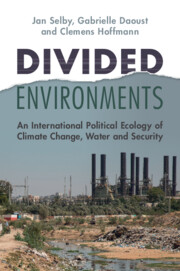1 - Introduction
Published online by Cambridge University Press: 15 September 2022
Summary
This full-length chapter introduces the book’s central themes and approach to analysing them. It starts by summarising the current public and policy ‘common sense’ on climate security, and by showing that the evidence base for this orthodoxy is weak or, at best, contested: this establishes the book’s primary research puzzle. With this set out, the remainder of the chapter details the book’s approach to exploring this crucial but contested issue. It does this first with regard to epistemology and method – critiquing extant environment-centric, quantitative and discourse-centric approaches, and via that articulating an alternative ‘international political ecology’ framework for the analysis of environment–security relations. It does it, second, in substantive terms, explaining the book’s focus on water as a key variable in, and analogue for understanding, climate–security linkages. And it does it, third, with regard to cases, introducing the book’s empirical focus on the five ‘divided environments’ of Cyprus, Israel–Palestine, Sudan–South Sudan, Syria and the Lake Chad basin. The chapter concludes by briefly explaining how the remainder of the book is organised.
Keywords
Information
- Type
- Chapter
- Information
- Divided EnvironmentsAn International Political Ecology of Climate Change, Water and Security, pp. 1 - 32Publisher: Cambridge University PressPrint publication year: 2022
